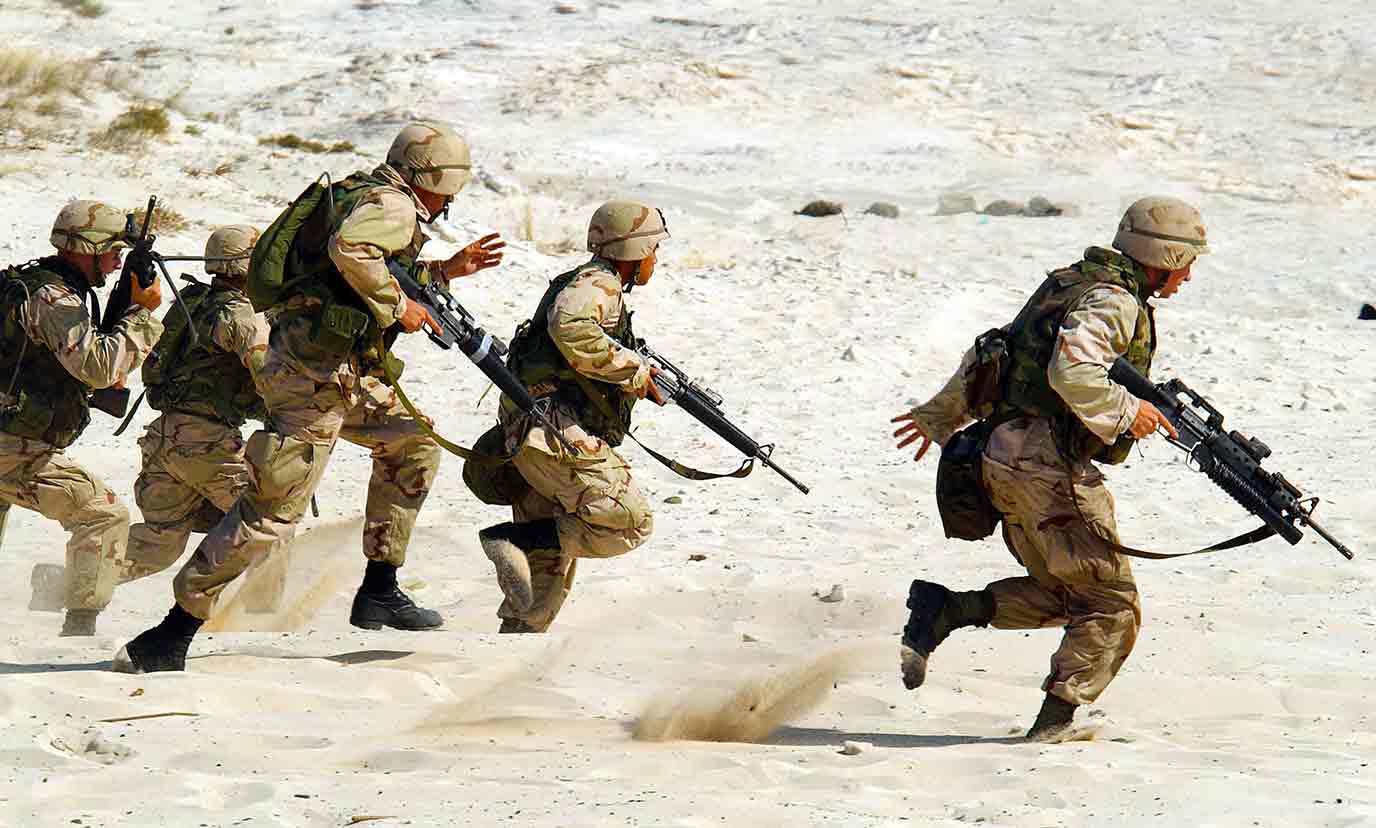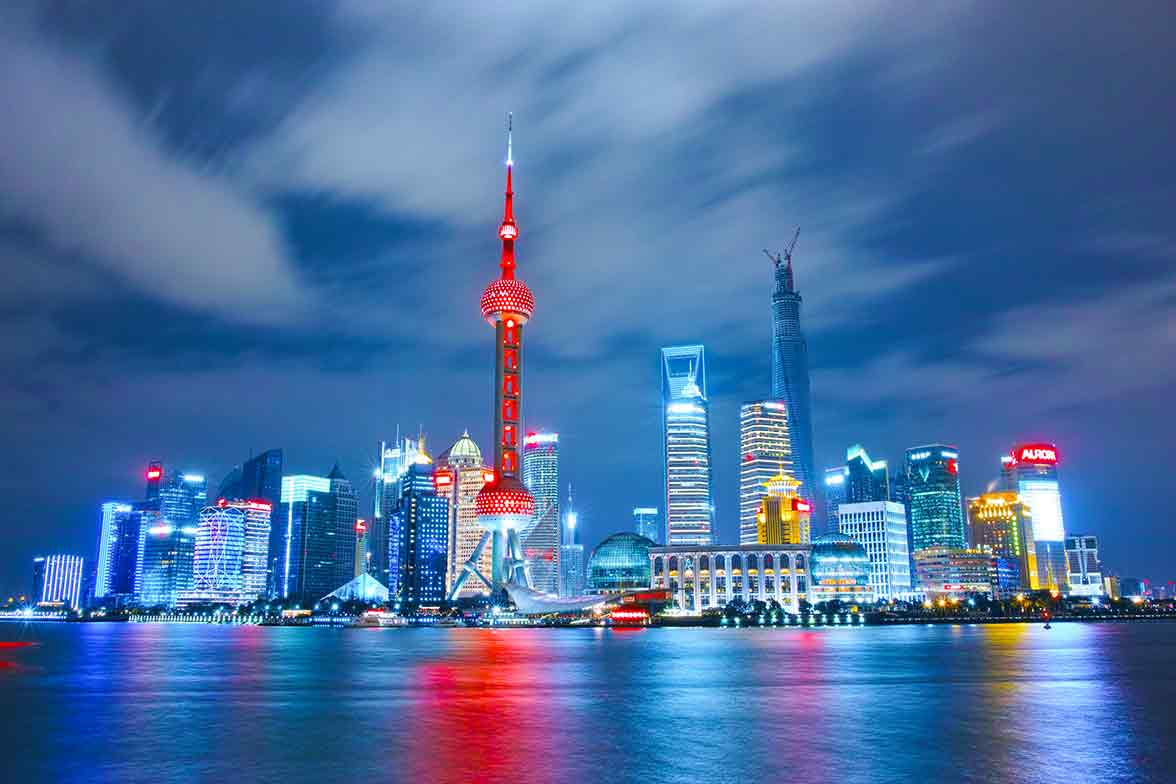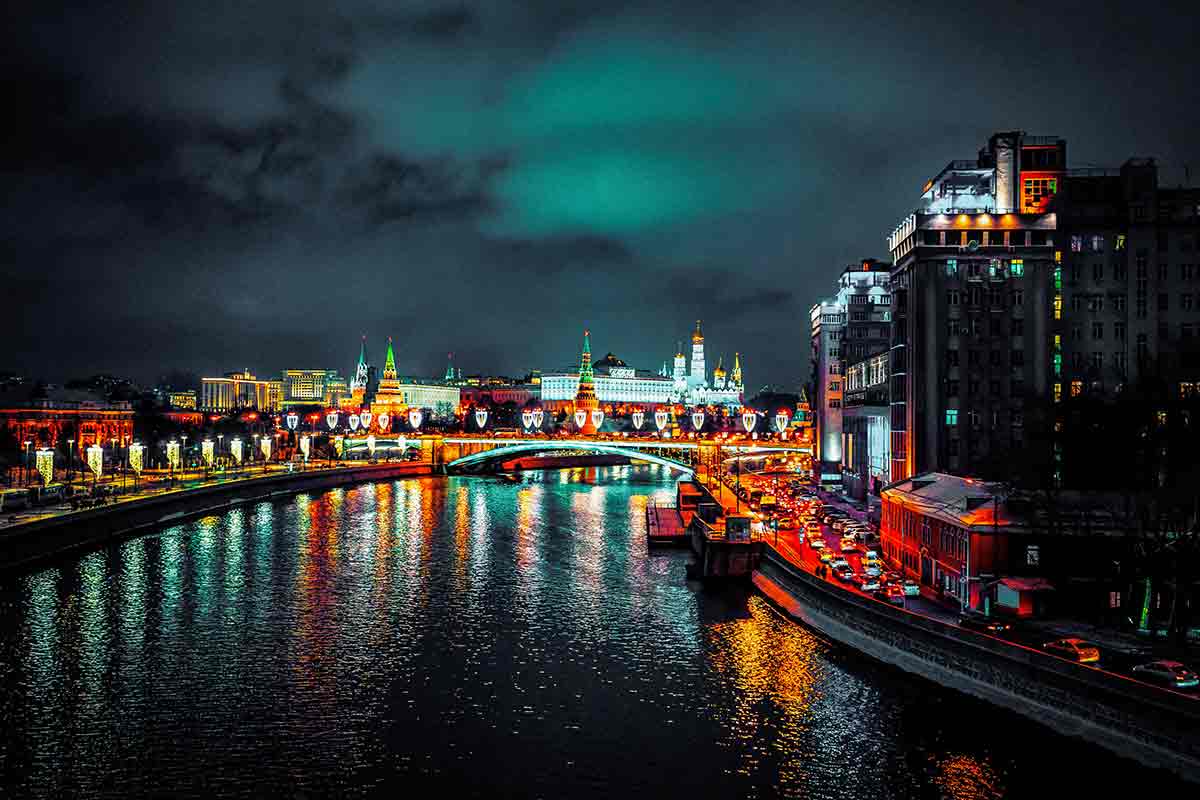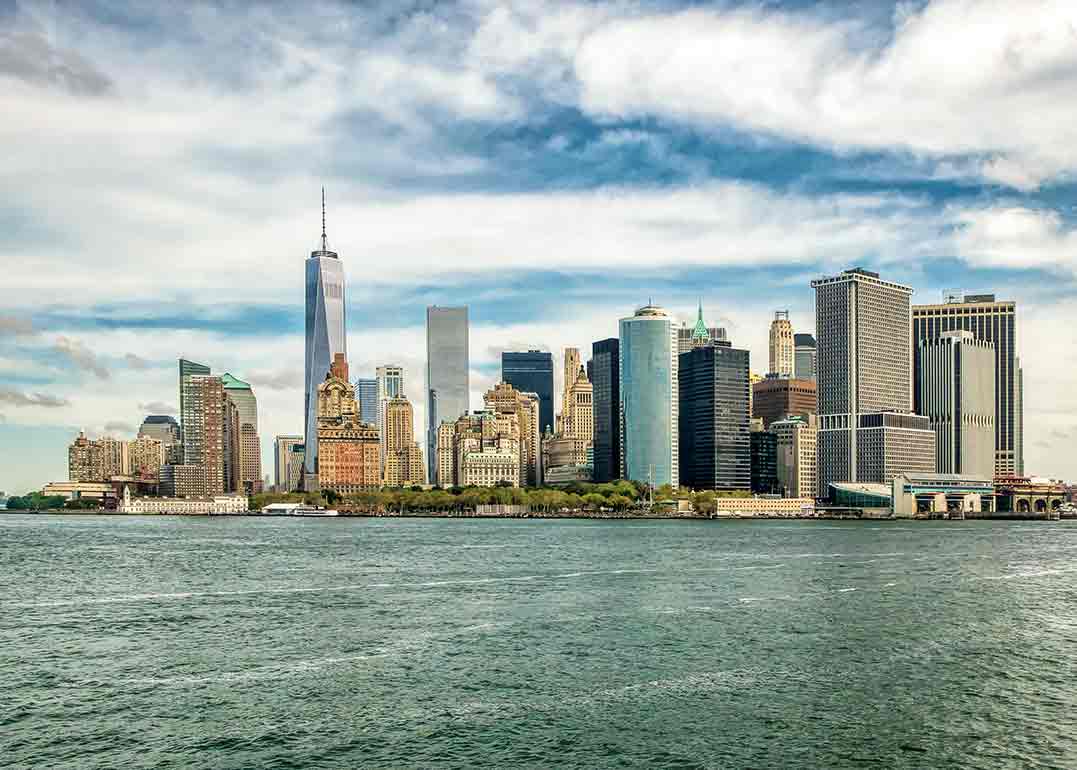The beginning of January is a good time to summarize the previous year. Of course, in early 2021, the key theme everywhere in such summaries is the coronavirus, the fight against it and the related social and economic perturbations that have been absorbing public attention since at least March. However, let us try to rise above this fog of more or less credible reports, denials, explanations and theories - including conspiracies - and look at the world from the point of view of the global situation.
So let's try to answer the fundamental question: what is the real situation in the world today? Before our eyes - but to a large extent, both for Americans and Poles, unnoticeably - great changes are taking place in the international system, and - at the same time - a revolution in military affairs is ongoing. So the question arises whether we are not in an imminent danger of war, and not only of a limited regional conflict, but maybe even real struggle on a global scale, the likes of which were not seen since the end of World War II? Additionally, we can ask whether this war - or at least the advanced preparations for it - has not already started.
Before we begin analyzing the current world situation, we must first establish some obvious facts. First of all, it is impossible to effectively predict the future, which would have to depend on a correct and thorough analysis of all world political trends, countless local and regional dynamics and international conditions. It cannot be done. There are too many factors that can shape the course of international relations on the global stage and no one can hope for a concise synthesis of them all. Additionally, wars are notoriously unpredictable, as are economic crises, and the future of many other complex or chaotic systems, such as the weather, in the long run.
However, it is possible to attempt an overview of the situation based on geopolitical analysis, which would try to take into account at least the most important factors that shape the political situation and, on this basis, assess the likelihood of conflicts, including military ones. In this article, I allowed myself to use, among others, the opinions of prominent Polish geopoliticians, such as Dr. Leszek Sykulski, dr. Jacek Bartosiak, prof. Bogdan Góralczyk, and others whose knowledge and geopolitical awareness should, in my opinion, be known to a wider audience. We focus here on the three major global powers, whose mutual relations and accords will determine the shape of the world in the 21st century.
The year 2020 showed with great intensity the epic processes taking place in the world. Some geopoliticians are of the opinion that the 20s of the 21st century will, in some respects, be analogous to the years preceding the outbreak of World War I, or the 1930s, i.e. the period just before the Second World War.
That serious economic or social crises can lead to military confrontation is rather obvious, and the current economic crisis caused by the coronavirus pandemic is the worst since the Great Depression of 1929-32, which was instrumental in unleashing World War II.
Three Superpowers
During the Cold War, the peace and stability in the world relied on the equilibrium between the two superpowers that held themselves in a state of a nuclear checkmate for a long time. After the collapse of the USSR, from the beginning of the 90s of the last century, this balance became more one-sided and it was America that became practically the only guardian protecting the world order, playing the role of a global gendarme. Thus, for the past 30 years, the United States has been the undisputed political and military hegemon in the world. The stability of the international system depended on the US as an exporter and guarantor of security, in return for trade and economic concessions.
At present, we are witnessing the process of overcoming this hegemony by new contenders. In particular, China and Russia are challenging America's leadership and pursuing a policy of undermining America's influence. The process of the polycentric re-orientation of the world, and thus the departure from the essentially unipolar force, is not only underway, but it can be said to be quite advanced. When the United States decide - or are forced - to withdraw from their role as a global superpower, it will have far-reaching consequences.
China
China is the "Middle Kingdom" (中国, or Zhōng guó, lit. center-country) - for many centuries it has been the strongest economy and military power in the world. According to professor Bogdan Góralczyk, an outstanding sinologist from the University of Warsaw, China is a civilization dressed in state clothes. Let us add after the Professor, that this is the longest lasting civilization that has survived to this day, and it has survived such powers as ancient Egypt, Babylon, Greece, Rome, Byzantium, etc.
It is the most serious contender today to be the global superpower - arguably the most powerful adversary the US has ever faced. The Americans have never had such a formidable rival that not only produces and exports far more than the U.S., has three times the population - over which it has total control - but also pursues a far-reaching and far-sighted policy that looks decades ahead as opposed to the typically American political horizon, which usually extends only to the next elections. The Chinese are seasoned players with long-term goals.
In the past, Americans have always been demographically stronger, produced more, had more capital, and had a better industrial base than their opponents. The combined GDP of Nazi Germany and imperial Japan in the early 1940s was less than 40% of America's, with the US then having the British Empire and the Soviets on its side. And now they have a competitor who is more powerful: nominally, China is second in terms of GDP, but since 2015 it has surpassed the US in the so-called purchasing power, and thus - simply put - the ability to purchase, for example, strategic raw materials, abroad. Also in 2015, a truly Copernican revolution in finance took place - China began to be a net exporter of capital, i.e. an investor abroad, rather than a recipient of Western investments.
Time also works to China's advantage. Each year brings them trade and investment surpluses and the ability to further expand their own industries. 2020 in particular has contributed to bridging the gap between China and the United States in terms of economic development. Due to the fact that - it is believed - China managed to contain the COVID-19 epidemic better and faster than other countries, their economy is widely expected to grow by 2% in 2020, versus at least 5-10% of decline in other economies, including the US .
The current leader of the People's Republic of China, the first secretary of the CCP, Xi Jinping, who has secured unlimited and lifetime power in the country, has a vision of the future that focuses on restoring China to the dominance in Asia it enjoyed before the West entered into the picture in the 19th century. He is also seeking to restore control of the "Great China", including Xinjiang, Tibet, Hong Kong and Taiwan, and to regain a historic sphere of influence along China's borders and adjacent seas. From this list, only Taiwan is still beyond the reach of the Beijing authorities, but unification with it is the main task that Xi Jinping has set for himself. It is worth noting that a possible merger would create by far the largest economy in the world (according to data from 2019, Taiwan's GDP is around $600 billion, which is comparable to that of Poland or Switzerland).
“The Chinese authorities consider Taiwan as their most important geopolitical goal. «Resolving the Taiwan issue» remains a key part of China's long-term strategy," is how a detailed US study in November 2020 has put it, while USC political scientist Daniel Lynch notes: "Beijing is unlikely to tolerate Taiwan's de facto independence indefinitely.” [1] This is undoubtedly a potential flash point, as Taiwan is known as the furthest [American] carrier in the Western Pacific, and therefore a place of strategic importance to the US.
We have big things in mind, and now is the best time. [16]
This is how Xi Jinping welcomed the Gregorian New Year 2021 in his speech. All these Chinese goals outlined above are to be achieved in order to gain the respect of other great powers, and thus to restore China's image as at least equal to other superpowers and, at the same time, to make up for the development delay caused by the "Century of Humiliation" of China, since the time of the "Opium Wars", until the Mao revolution. This humiliation - and the emergence from it under the leadership of the Communist party - is consciously and skillfully played out in the propaganda, contributing to the rise of nationalist and patriotic sentiments. Allegedly, China is building an image of the US as the nation's greatest enemy.
What's more, the conjunction of America's decline with China rise is being presented as being of almost cosmic moral significance: an unalloyed good for the human race, and even for the world's flora and fauna — because irresponsible Western industrialization was claimed to be the root cause for most of the world's environmental problems. — Daniel Lynch [13]
It should be noted at this point that there are fundamental differences between Chinese and Western culture and civilization. According to professor Góralczyk, in line with the tenets of the so-called Confucian civilization, China has no concept of civil rights or individual freedoms. The citizen is subordinated to the interests of the state, and the properly prepared elite rather than a democracy is to rule. In the state, the citizen is bound by duties, not freedoms. It is the state - and not the citizen - that is the starting point for all considerations. Communism and Confucianism agree strongly here.
What could delay or hinder Chinese plans? In addition to any active US action in this regard, China has one weakness: it is much more dependent on the import of raw materials from abroad than is the United States. And here we encounter the question of Russia.
Russia
Russia is, by some assessments, an exhausted giant on weak legs, a great paradox dependent on oil. [10] The paradox is that the country, extremely rich in raw materials and resources, has not been able to break out of its [economic] stagnation for decades and to start developing faster. The Russian economy is said to contract by more than 6 percent in 2020, and the chances of a recovery this year are slim, among other reasons, due to the global decline in oil prices.
Apparently, however, the Russian government has used the recent years to rebuild its budget reserves, which reached record levels in mid-March 2020. As a result, Russia entered a crisis with a solid financial cushion, which saved her and her rulers from major shocks. [10] We will see how long this cushion will last for them, but Russia's dependence on the export of raw materials is a fact, and China needs raw materials.
It does not take a great strategist to conclude that these two countries will be on a convergent course. For a long time, they have been negotiating cooperation in various fields, completely and not by accident bypassing the United States. Russian resources are undoubtedly a tasty morsel for China, and China is a source of investments and an important economic partner for Russia. Interestingly, the roles have been reversed: once, communist Russia was the "Big Brother" for China, and now communist China is playing this role for Russia.
Russia's foreign and defense policy is conducted in the belief that the Russian Federation continues to be the leading, albeit temporarily weakened, international power. Like China, Russia would like to see its return to superpower status. The United States therefore faces the reappearance of its old enemy and rival. [1]
Over the past decade, Western Europe and the United States have shown astonishing weakness in the face of the confrontational policies of the Russian President Vladimir Putin, but Russia will almost certainly continue its current strategy, especially after Putin's re-election in March 2018 for another six-year term. Although the economic situation will limit Russia's actions, and its overall importance in the world economy is declining, is it really an exaggeration to expect that the economically weakened power will resort to force solutions to make up for the damage to its image?
At the moment, Russia is clearly convinced that China will win the world race for supremacy, but the Russians must ask themselves today what will the role of their country be in the competition with China later. Russia will therefore be forced to maneuver, figuratively speaking, between the American eagle and the Chinese dragon, trying to position itself in the most advantageous way.
The United States - if it chooses the path of open confrontation - in order to defeat China and strategically isolate it, must build an international coalition. Looking at the map of the world, it is clear that Russia's cooperation will be required to close this circle of blockade. While Americans still rule the seas, this is the only way to cut off China's raw material supplies overland. The anti-China coalition has no chance without Russia being drawn into it first.
In any case, Russia is now in a very comfortable position when everyone is vying for it, but so far it has clearly sided with China and has repeatedly shown its readiness to bet on a conflict with the West.
And here comes the specter of a potentially new Yalta and thus conclusions that are disturbing for Poles. In return for cooperation in restricting China's development, America may offer Russia concessions in Europe. It is hard to tell how far they would go, but in the end, it is difficult to resist the lessons of history and not to be afraid of a similar result as after the negotiations in Yalta in 1945 - tragic for Poland, as we know.
The United States
The United States does not seem to be sufficiently prepared at present to struggle for world domination and influence. The global trends we discussed above are not working in favor of the US. America's military advantage continues to decline. The United States remains mired in its own problems, and the rest of the world does not stand still.
We recently wrote about the creation of the world's largest trading bloc, the RCEP, covering a third of the world's population, under the clear leadership of, and with the greatest benefit to, China. This is just one example of America losing strategic influence in the world.
Americans are also increasingly reluctant to use military force - especially land forces - to enforce the international order. This is, of course, in contradiction to their role as "international policeman" so far, but could be an inexorable consequence of the collapse of the US economy. America simply cannot afford it anymore.
A 2016 Pew poll found that 57 percent of Americans believe the United States should "take care of its own problems and let others go about theirs." [1] As Cold War generation political leaders gradually withdraw from public life, there may be fewer and less vocal supporters of US internationalism and intervention.
Unfortunately, there is also no reason to believe that the rising polarization of the American electorate will reverse any time soon. On a structural level, despite periodic calls for the introduction of a third party, it is likely that the two main parties will continue to exercise power. Nor does polarity among voters, and hence the deeply entrenched divisions of a geographic, socio-economic, racial and cultural nature - coast against the heart of the country, manual workers against white-collar workers, minority versus white race, South versus North - appear in reduce it soon. [1]
Rising polarization, disappointment and isolationism in America, political deadlock, and electoral disappointment may prevent the United States from acting as a global superpower. This could create a power vacuum, allowing other powers (especially China and Russia) to try to fill that void. The United States will also have to deal with other problems posed by Iran, North Korea, and terrorism.
The Three Body Problem
The three body problem is the name for the physical description of the motion of three point bodies that interact only by gravity. The mathematical explanation of the details of this movement is extremely difficult and reportedly gave Newton a headache [12], and the end result - due to the chaotic instability of such systems - may be the expulsion of one of the bodies out of the range of the system.
By analogy to the physical phenomenon, the observable multipolarization of the world, the departure from both the hegemony of one superpower (the United States) and the balance of two powers (as was the case during the Cold War between the US and the USSR), seems to create a similar situation in which it is difficult to predict the exact trajectory of the further course of events. One thing is certain - the current system is unstable and unsustainable in the long run, and the scratches in its structure are already visible to the naked eye.
Will a global armed conflict be avoided or, on the contrary, is it inevitable? Or is it already underway, but not yet on the geographic battlefield? Will the United States keep its lead in the world? Will China soon become the world's greatest superpower? Will they manage to incorporate Taiwan, against US interests? Will Russia act as a proverbial tongue in the struggle between superpowers, or will it be reborn as the third contender for this title? What will these global reshuffles mean for the future of Europe, and Poland in particular? We will write about it all.










